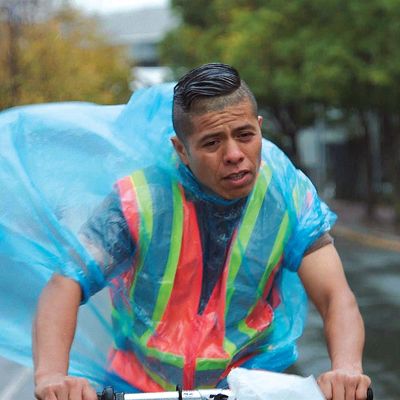
The main character in Jim McKay’s En el Séptimo Día is an undocumented Mexican immigrant and food deliveryman named José, and while the film isn’t nonfiction (José is played by an actor, Fernando Cardona), he has similarities to the guy who brought me dinner last week and the guy who swerved into my car’s path while I was making a turn. Was that me in the film yelling, “Ya dumb fuck!” Could have been — it’s Brooklyn. Beyond that contact, I have no idea how a man like José came to live here; how he lives, period; and how a privileged person like me looks through his eyes.
Thanks to McKay’s gentle but overwhelming film, I know that José sleeps in a Sunset Park apartment alongside nine other undocumented Mexicans — the number fluctuates depending on whom the super brings in on any given day. He has a pregnant wife back home: He wants to get her up here so the baby can be born in the U.S., but he can’t trust her fate to a coyote. He’s also superb at fútbol — so good his team could win the championship, scheduled for a Sunday, seven days after the film begins. But his boss, Steve, says José has to work that seventh day because of a private birthday party, and José needs Steve’s help to get working papers, as well as off his bike and onto “the floor” as a waiter and — maybe someday — a manager. You get the point: God rested on the seventh day, but no way, José.
Unable to tell his teammates that he can’t play, José leans against his bike and eats his lunch and thinks … and eats … the only soundtrack the squeals and horns of Brooklyn traffic. It goes on almost a minute, but it’s not remotely boring because by that point, we’re thinking along with him, trying to figure out how we’re going to navigate an impossible situation. True, that soccer game isn’t the whole world, but it’s the one time in José’s life that he can show mastery and that he can feel free.
McKay does no editorializing in En el Séptimo Día. He’s a simple, graceful storyteller — so graceful that we don’t notice all the technique he brings to the task of making us see the world through José’s eyes. In the course of his over 20-year career, the director has moved back and forth between community-based dramas like the high-school-marching-band film Our Song and TV series like In Treatment, Rectify, Treme, and The Good Wife — as well as random episodes of your favorite shows like The Wire, The Americans, and Bosch. Even with all those credits, this is one of the high points.
Nothing slows down McKay’s narrative, but nothing is casual either. The other poor immigrants José greets in food stores — peeling carrots or wrapping flowers, under the eyes of Korean owners — are essential parts of this urban ecosystem. A priest pops up briefly to ask about José’s wife and encourage him to think about unionizing, the way the beleaguered car-wash employees have, but his is a voice from another world. So is the voice of the well-dressed Spanish-speaking guy at one of the fancy buildings to which José delivers. He’s very friendly (he has a Mexican girlfriend, he says, who follows fútbol), but José plainly registers the enormous social gap between them. This is a world defined by gaps — chasms, really, as implacable as the canal over which José rides back and forth, the Gowanus, now the world’s hippest Superfund site. An unjustly belligerent customer in a cool Gowanus warehouse works at “Resistance Media,” but what’s being resisted isn’t clear — certainly not economic inequality or the plight of immigrants.
En el Séptimo Día has a built-in Go For It hook — that championship game, in which José is forbidden to play but somehow gets to, by near-farcical means. The movie is very enjoyable, though with a sting in its tail. The nominal bad guy, Steve (Christopher Gabriel Núñez), is a creep, but he’s not evil. He simply has too many incentives to have no empathy. Knowing the hearts of his employees would get in the way of doing business in a tough market. McKay leaves those of us with vastly more power than José feeling angry at ourselves for living comfortably within this system, for lacking not so much empathy as curiosity. I didn’t know much, and now I know a little more. And I know that it’s nowhere near enough.
*This article appears in the June 11, 2018, issue of New York Magazine. Subscribe Now!


